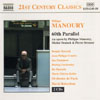Manoury 60th Parallel
The first release in Naxos’s 21st Century Classics series is disappointing, but the opportunity to hear contemporary opera on disc is very welcome
View record and artist detailsRecord and Artist Details
Composer or Director: Philippe Manoury, Paul Gay
Genre:
Opera
Label: Naxos
Magazine Review Date: 1/2001
Media Format: CD or Download
Media Runtime: 89
Catalogue Number: 8 554249/50

Tracks:
| Composition | Artist Credit |
|---|---|
| 60th Parallel |
Philippe Manoury, Composer
Alexandre Caussé, Voix d'enfants, Vocalist/voice Camille d' Ollone, Voix d'enfants, Vocalist/voice David Robertson, Conductor Donald Maxwell, Rudy Link, Baritone Hedwig Fassbender, Anja, Mezzo soprano Ian Thompson, Le Docteur Wittkop, Tenor Jean-Marc Salzmann, L'Homme au transistor, Baritone Jean-Philippe Courtis, Wim Kosowitch, Bass Julie Vulliez, Voix dans le haut-parleur, Vocalist/voice Magdalena Wiedenhofer, La petite fille, Vocalist/voice Marie-Thérèse Keller, L'Hôtesse de l'air, Mezzo soprano Menai Davies, La Femme, Mezzo soprano Orchestre de Paris Paul Gay, Composer Philippe Manoury, Composer Rie Hamada, Maria, Soprano |
Author: Fabrice Fitch
By the standards of contemporary opera, 60th Parallel has had good exposure. Commissioned by IRCAM and Paul Sacher (among others) and first performed in 1997 at the Theatre du Chatelet, the work was even broadcast on British television a couple of years ago. The plot, developed in collaboration between the composer, the librettist Michel Deutsch and the director Pierre Strosser, is an absurdist huis-clos of people stranded in an airport departure lounge during a snowstorm: two men, one of whom is an east-European war criminal who eventually kills the other after he being threatened with exposure; two women flying off on holiday together, one of whom secretly loves the other; a mad scientist on his way to a conference with Einstein’s brain as hand-luggage; a harassed air hostess, and a few extras.
The trouble is that these plotlines are insufficient to sustain 90 minutes’ entertainment, so the action (such as it is) and the dialogues are thinly spread. Other problems are the contrast between the purposely banal dialogues (‘Would you like an orange?’ ‘No thanks.’ ‘Wait, what about some chocolate then?’ etc) and the mostly post- expressionistic stance of the music for large orchestra, supplemented by (recorded) electroacoustics, and Manoury’s attitude to vocal writing here, modelled (as he says) more on Debussy and Strauss than Berio or Ligeti. It is a truism that the traditional relationship between action and music in opera requires the suspension of disbelief on the part of the audience, but 60th Parallel stretches credibility too far – and what is worse (as I have to suspect), it does so unintentionally. Finally, there is the music itself, static, undynamic and overly uniform: all a roundabout way of saying that I would have trouble recommending the work to any but those whose dedication to contemporary art is such that they must try anything once.
But at the end of the day, what need be said these days of a recording of contemporary opera by a major label, apart from the fact that its existence is good, indeed necessary? From a certain viewpoint, that is the most important thing about this issue, for the general public’s access to contemporary music is increasingly at a premium. In that sense it doesn’t really matter what this reviewer or that makes of a given project. What does is the message that Naxos sends out by making 60th Parallel available: contemporary art matters. It’s a message that gives me hope. I trust that hope is not misplaced.'
The trouble is that these plotlines are insufficient to sustain 90 minutes’ entertainment, so the action (such as it is) and the dialogues are thinly spread. Other problems are the contrast between the purposely banal dialogues (‘Would you like an orange?’ ‘No thanks.’ ‘Wait, what about some chocolate then?’ etc) and the mostly post- expressionistic stance of the music for large orchestra, supplemented by (recorded) electroacoustics, and Manoury’s attitude to vocal writing here, modelled (as he says) more on Debussy and Strauss than Berio or Ligeti. It is a truism that the traditional relationship between action and music in opera requires the suspension of disbelief on the part of the audience, but 60th Parallel stretches credibility too far – and what is worse (as I have to suspect), it does so unintentionally. Finally, there is the music itself, static, undynamic and overly uniform: all a roundabout way of saying that I would have trouble recommending the work to any but those whose dedication to contemporary art is such that they must try anything once.
But at the end of the day, what need be said these days of a recording of contemporary opera by a major label, apart from the fact that its existence is good, indeed necessary? From a certain viewpoint, that is the most important thing about this issue, for the general public’s access to contemporary music is increasingly at a premium. In that sense it doesn’t really matter what this reviewer or that makes of a given project. What does is the message that Naxos sends out by making 60th Parallel available: contemporary art matters. It’s a message that gives me hope. I trust that hope is not misplaced.'
Discover the world's largest classical music catalogue with Presto Music.

Gramophone Digital Club
- Digital Edition
- Digital Archive
- Reviews Database
- Full website access
From £8.75 / month
Subscribe
Gramophone Full Club
- Print Edition
- Digital Edition
- Digital Archive
- Reviews Database
- Full website access
From £11.00 / month
Subscribe
If you are a library, university or other organisation that would be interested in an institutional subscription to Gramophone please click here for further information.




